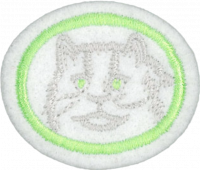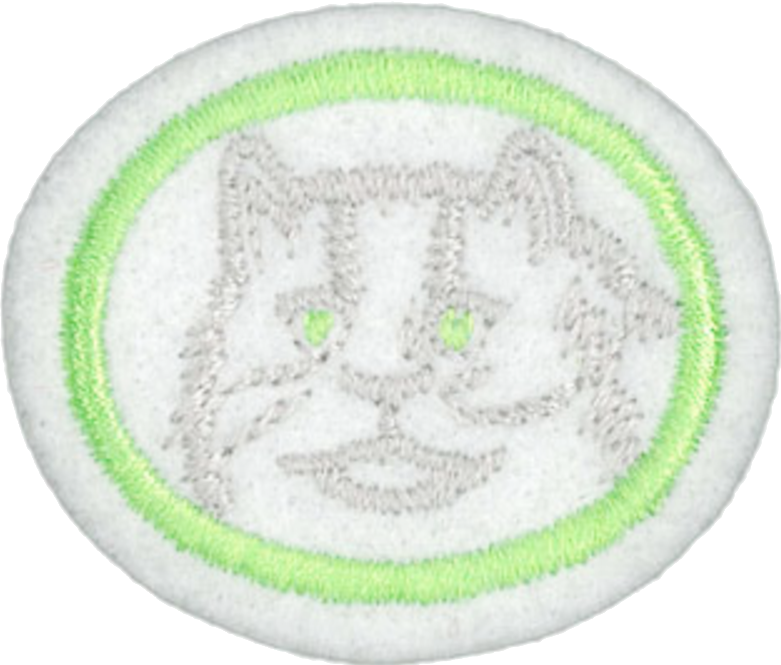|
|
| (9 intermediate revisions by 2 users not shown) |
| Line 2: |
Line 2: |
| | <!--{{Honor_Master|honor=Cats|master=Naturalist|group=Domestic}}--> | | <!--{{Honor_Master|honor=Cats|master=Naturalist|group=Domestic}}--> |
| | <!--{{Honor_Master|honor=Cats|master=Zoology|group=Domestic}}--> | | <!--{{Honor_Master|honor=Cats|master=Zoology|group=Domestic}}--> |
| − | <section begin="Body" /> | + | <section begin="Body" /> |
| | + | |
| | {{ansreq|page={{#titleparts:{{PAGENAME}}|2|1}}|num=1}} | | {{ansreq|page={{#titleparts:{{PAGENAME}}|2|1}}|num=1}} |
| | <noinclude></noinclude> | | <noinclude></noinclude> |
| Line 74: |
Line 75: |
| | {{CloseReq}} <!-- 7 --> | | {{CloseReq}} <!-- 7 --> |
| | {{ansreq|page={{#titleparts:{{PAGENAME}}|2|1}}|num=8}} | | {{ansreq|page={{#titleparts:{{PAGENAME}}|2|1}}|num=8}} |
| − | <noinclude><div lang="en" dir="ltr" class="mw-content-ltr"> | + | <noinclude></noinclude> |
| − | </noinclude> | + | <!-- 8. ¿Qué beneficio tiene para el hombre los gatos domésticos? --> |
| − | <!-- 8. Of what benefit to man are domesticated cats? --> | |
| − | Cats catch mice and provide friendship. They are used in China and Japan to protect silkworm cocoons from rats.
| |
| − | </div>
| |
| | | | |
| − | <div lang="en" dir="ltr" class="mw-content-ltr">
| + | <noinclude></noinclude> |
| − | <noinclude> | |
| − | </div></noinclude>
| |
| | {{CloseReq}} <!-- 8 --> | | {{CloseReq}} <!-- 8 --> |
| | {{ansreq|page={{#titleparts:{{PAGENAME}}|2|1}}|num=9}} | | {{ansreq|page={{#titleparts:{{PAGENAME}}|2|1}}|num=9}} |
| − | <noinclude><div lang="en" dir="ltr" class="mw-content-ltr"> | + | <noinclude></noinclude> |
| − | </noinclude> | + | <!-- 9. Nombrar siete tipos de gatos salvajes. Identificar y decir en qué parte del mundo se encuentran. --> |
| − | <!-- 9. Identify from pictures or personal observation seven kinds of wild cats. Tell in what part of the world they are found. --> | |
| − | ===Caracal===
| |
| − | [[image:Caracal.jpg|thumb|left|400px|Caracal]]
| |
| − | Caracals are distributed over Africa and West Asia. Their habitat is dry steppes and semi-deserts, but also woodlands, savanna, and scrub forest. They are solitary, or paired, territorial cats.
| |
| − | <br style="clear:both"/>
| |
| − | </div>
| |
| | | | |
| − | <div lang="en" dir="ltr" class="mw-content-ltr">
| + | {{clear}} |
| − | ===Cheetah===
| |
| − | [[image:Cheetah_in_Kenya.jpg|thumb|left|400px|Cheetah]]
| |
| − | [[Image:cheetah range.png|thumb|right|Places where cheetahs live are colored green.]]
| |
| − | <br style="clear:both"/>
| |
| − | Today, most cheetahs are found in sub-Saharan Africa, though a few are still seen in Iran. In the past, they used to be found throughout northern India and Iran. They prefer to live in semi-deserts, savannas, prairies, and thick brush. Because they rely upon speed to hunt, they avoid dense forests.
| |
| − | </div>
| |
| | | | |
| − | <div lang="en" dir="ltr" class="mw-content-ltr">
| + | {{clear}} |
| − | ===Jaguar===
| |
| − | [[image:Panthera_onca.jpg|thumb|400px|left|Jaguar]]
| |
| − | [[Image:jaguar range.png|thumb|right|Places where jaguars live are colored green.]]
| |
| − | <br style="clear:both"/>
| |
| − | Jaguars live in the rain forests and more open countryside in South and Central America, and are the largest members of the cat family there. Jaguars are strong swimmers and climbers, and they often prefer to live by rivers, in swamps, and in dense forest with thick cover for stalking prey. Jaguars once lived as far north as the southwestern United States. Some of these cats are once again migrating north from Mexico.
| |
| − | </div>
| |
| | | | |
| − | <div lang="en" dir="ltr" class="mw-content-ltr">
| + | {{clear}} |
| − | ===Leopard===
| |
| − | [[image:Leopard_on_the_tree.jpg|thumb|left|400px|Leopard]]
| |
| − | [[File:Leopard prevalence.png|thumb|right|Places where leopards live are colored red.]]
| |
| − | <br style="clear:both"/>
| |
| − | </div>
| |
| | | | |
| − | <div lang="en" dir="ltr" class="mw-content-ltr">
| + | {{clear}} |
| − | Leopards live in the Middle East, parts of Asia, and Africa. This means they live in more places than any other big cat.
| |
| − | </div>
| |
| | | | |
| | {{clear}} | | {{clear}} |
| | | | |
| − | <div lang="en" dir="ltr" class="mw-content-ltr">
| + | {{clear}} |
| − | ===Lynx===
| |
| − | [[Image:Lynx lynx poing.jpg|thumb|400px|left|Lynx]]
| |
| − | [[Image:lynx range.png|thumb|right|Places where lynx live are colored green.]]
| |
| − | The four species of lynx are very widespread. The European Lynx lives in northern Europe and Asia. The Canadian Lynx lives in North America. The Iberian (or Spanish) Lynx is one of the most highly endangered cats and only lives in wild parts of Spain. Bobcats are the smallest type of lynx, living in North America. Because they hunt small prey, they live in a wide variety of habitats.
| |
| − | <br style="clear:both"/>
| |
| − | </div>
| |
| | | | |
| | {{clear}} | | {{clear}} |
| Line 144: |
Line 109: |
| | {{CloseReq}} <!-- 9 --> | | {{CloseReq}} <!-- 9 --> |
| | {{ansreq|page={{#titleparts:{{PAGENAME}}|2|1}}|num=10}} | | {{ansreq|page={{#titleparts:{{PAGENAME}}|2|1}}|num=10}} |
| − | <noinclude><div lang="en" dir="ltr" class="mw-content-ltr"> | + | <noinclude></noinclude> |
| − | </noinclude> | + | <!-- 10. ¿Qué animal se conoce como el rey de selva? ¿Por qué tiene ese título? ¿Cómo es realmente su temperamento? --> |
| − | <!-- 10. What animal is known as the king of beasts? Why does it have that title? What is its temperament really like? --> | |
| − | The lion is known as the ''king of the beasts''. This goes back as far as recorded history, for the Greek word for ''lion'' is translated as ''king'' in Latin. The lion gets this distinction because it fears no other animal. It is also said that the lion is named ''king of the beasts'' because of its courage and loyalty. Its courage cannot be doubted, but a lion is not particularly loyal. Male lions are known to take over another male's pride of females by chasing away (or killing) the resident male(s). They often form ''coalitions'' of two to five males and work together to oust other males. When they succeed in doing this, they then kill any cubs in the pride so that the females will be receptive to breeding sooner. The females sometimes attempt to defend their cubs, but this is rarely met with success. These coalitions of males do not limit their activities to a single pride either. A coalition may dominate several prides within their range. Not exactly a model of loyalty! (But then again, neither are human kings).
| |
| − | </div>
| |
| | | | |
| | <noinclude></noinclude> | | <noinclude></noinclude> |
| | {{CloseReq}} <!-- 10 --> | | {{CloseReq}} <!-- 10 --> |
| | {{ansreq|page={{#titleparts:{{PAGENAME}}|2|1}}|num=11}} | | {{ansreq|page={{#titleparts:{{PAGENAME}}|2|1}}|num=11}} |
| − | <noinclude><div lang="en" dir="ltr" class="mw-content-ltr"> | + | <noinclude></noinclude> |
| − | </noinclude> | + | <!-- 11. Contar la historia de Androcles y el león. --> |
| − | <!-- 11. Tell the story of Androcles and the lion. --> | |
| − | Androcles was a Roman slave who escaped and took refuge in a cave. One day, a lion entered the cave, limping badly. Androcles examined its paw and removed a large thorn. The lion became cured and tamed by Androcles and also lived in the cave with Androcles until Androcles was later re-captured. Androcles was tried and sentenced to be torn to pieces by a hungry lion. On the fateful day, the lion, chosen to destroy him, began to lick his face and hands with obvious affection instead of eating him. It was the same lion that Androcles befriended in the cave. The authorities were moved by this show of affection. The king pardoned and set Androcles free. They also allowed Androcles to keep the lion as a companion and he walked the streets of Rome with it.
| |
| − | </div>
| |
| | | | |
| | <noinclude></noinclude> | | <noinclude></noinclude> |
| | {{CloseReq}} <!-- 11 --> | | {{CloseReq}} <!-- 11 --> |
| | {{ansreq|page={{#titleparts:{{PAGENAME}}|2|1}}|num=12}} | | {{ansreq|page={{#titleparts:{{PAGENAME}}|2|1}}|num=12}} |
| − | <noinclude><div lang="en" dir="ltr" class="mw-content-ltr"> | + | <noinclude></noinclude> |
| − | </noinclude> | + | <!-- 12. Contar cuatro historias de la Biblia donde se menciona un miembro de la familia de los gatos. --> |
| − | <!-- 12. Relate four stories in the Bible in which a member of the cat family is mentioned. --> | |
| − | * Samson and the lion. (Judges 14)
| |
| − | * David killed a lion and a bear (1 Samuel 17:36)
| |
| − | * Lion killed a disobedient prophet. (1 Kings 13)
| |
| − | * Benaiah killed a lion in a snowy pit. (1 Chronicles 11:22)
| |
| − | * Calf and the lion will lie down together in heaven. (Isaiah 11:6,7)
| |
| − | * Can a leopard change his spots? (Jeremiah 13:23)
| |
| − | * Daniel and the Lion's Den (Daniel 6)
| |
| − | * Daniel's dream of the lion with wings and leopard with four heads. (Daniel 7)
| |
| − | </div>
| |
| | | | |
| | <noinclude></noinclude> | | <noinclude></noinclude> |
| | {{CloseReq}} <!-- 12 --> | | {{CloseReq}} <!-- 12 --> |
| | <noinclude></noinclude> | | <noinclude></noinclude> |
| − | ==Referencias== | + | ==Referencias==</noinclude> |
| | | | |
| − | <div lang="en" dir="ltr" class="mw-content-ltr">
| + | [[Category:Adventist Youth Honors Answer Book/Do at home{{GetLangSuffix}}]] |
| − | [[Category:Adventist Youth Honors Answer Book|{{#titleparts:{{PAGENAME}}|1|3}}]]
| |
| − | [[Category:Adventist Youth Honors Answer Book/Do at home|{{SUBPAGENAME}}]] | |
| − | <noinclude>
| |
| − | </div></noinclude>
| |
| | {{CloseHonorPage}} | | {{CloseHonorPage}} |


